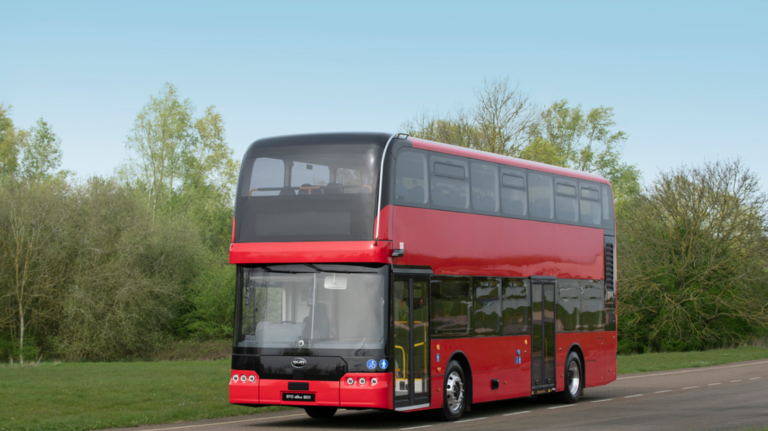Chinese automotive company BYD has launched its fully electronic BYD BD11 Double Deck Bus today [21 May].
The unveiling took place at the London Bus Museum, a venue which houses BYD’s K9E chassis dedicated to London’s transport network.
With 1500 electric buses delivered in the UK to date, saving more than 55m tonnes of CO2 per annum, BYD’s latest electric bus was also designed with London in mind, the BD11 seeking to improve on the environmental savings, efficiency and reliability of its predecessors currently operational in the capital.
BYD’s UK managing director Frank Thorpe took to the stage to reveal some of the BD11’s new features including its active suspension control and enhanced safety, including its Advanced Driver Assistance System.
BYD’s UK managing director Frank Thorpe said: “Battery security and battery supply is critical to bus operations in the UK.
“As assets, [buses] need to last anything from twelve to twenty years so the security of having a manufacturer who can support and supply that battery – which in many ways is the engine and fuel – is critical to the long term viability of bus operations and electric buses.
“Our integrated drive line is also hugely important to us. We design, develop and manufacture so we’re able to put the battery with the motor and controller in the optimum position.
“We are proud to launch our own all-new electric double decker bus with highly innovative, world-leading technology for safe and reliable electric mobility, providing operators with modern eco-friendly eBus options that meet their specifications, thus providing more people the choice to use clean, non-polluting bus services in the future.”
In addition, the BD11 is equipped with an integrated thermal management system to optimise energy utilisation.
The bus also utilises BYD’s Blade Battery which, while undergoing nail penetration tests, emitted neither smoke nor fire after being penetrated, and its surface temperature only reached 30 to 60°C.
READ MORE: BYD-Alexander Dennis partnership hands over 1,500th electric bus
Under the same conditions, a ternary lithium battery exceeded 500°C and violently burned, and while a conventional lithium iron phosphate block battery did not openly emit flames or smoke, its surface temperature reached dangerous temperatures of 200 to 400°C.
The Blade Battery also passed other extreme test conditions, such as being crushed, bent, being heated in a furnace to 300°C and overcharged by 260%. None of these resulted in a fire or explosion.
Discussing the technical innovations of the BD11, BYD product manager Peter wu said: “This new battery has a longer range and a longer life cycle than its predecessor.
“It has a new lightweight structure but is comprised of an ultra strength, steel frame which, in our testing, survived being rolled over by a fully-loaded, 50-tonne truck, successfully passing without leakage, defamation or smoke, coming up fully intact and ready to be used in an electric vehicle.
“We’ve also integrated the Blade Battery pack into the chassis, lowering the centre of gravity which improves safety and increasing space within the vehicle for improved passenger capacity.”
Achievements and innovations in EV charging infrastructure will be celebrated at the third annual CiTTi Awards, which will be held on 26 November 2024 at De Vere Grand Connaught Rooms in London. Nominations are open now! Please visit www.cittiawards.co.uk to learn more about this unmissable event for the UK’s transportation sector.





